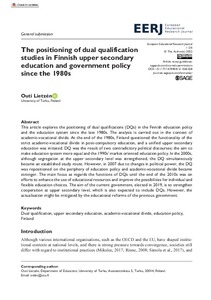The positioning of dual qualification studies in Finnish upper secondary education and government policy since the 1980s
Lietzén Outi
The positioning of dual qualification studies in Finnish upper secondary education and government policy since the 1980s
Lietzén Outi
SAGE PUBLICATIONS LTD
Julkaisun pysyvä osoite on:
https://urn.fi/URN:NBN:fi-fe2022081154888
https://urn.fi/URN:NBN:fi-fe2022081154888
Tiivistelmä
This article explores the positioning of dual qualifications (DQs) in the Finnish education policy and the education system since the late 1980s. The analysis is carried out in the context of academic-vocational divide. At the end of the 1980s, Finland questioned the functionality of the strict academic-vocational divide in post-compulsory education, and a unified upper secondary education was initiated. DQ was the result of two contradictory political discourses: the aim to make education system more equal and the 1990s' market oriented education policy. In the 2000s, although segregation at the upper secondary level was strengthened, the DQ simultaneously became an established study route. However, in 2007 due to changes in political power, the DQ was repositioned on the periphery of education policy and academic-vocational divide became stronger. The main focus as regards the functions of DQs until the end of the 2010s was on efforts to enhance the use of educational resources and improve the possibilities for individual and flexible education choices. The aim of the current government, elected in 2019, is to strengthen cooperation at upper secondary level, which is also expected to include DQs. However, the actualisation might be mitigated by the educational reforms of the previous government.
Kokoelmat
- Rinnakkaistallenteet [27094]
